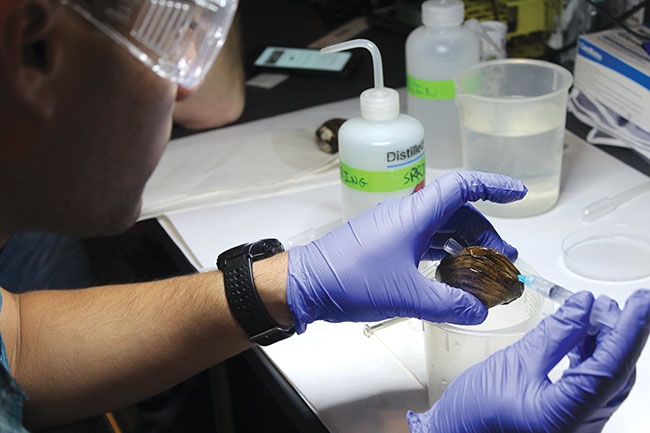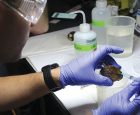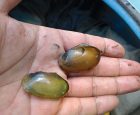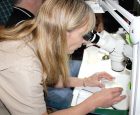
Features
Restocking
US$7.9M funding for freshwater mussel hatchery in Pennsylvania
In Pennsylvania, depleted mussel beds in the Delaware and Susquehanna river basins will soon get a helping hand with a new US$7.9 million funding agreement to build a freshwater mussel hatchery in southwest Philadelphia’s Bartram’s Garden. The Partnership for the Delaware Estuary signed the funding agreement with the Pennsylvania Infrastructure Investment Authority.
June 25, 2019 By Bonnie Waycott
 Using a syringe to gently flush glochidia larvae from a female yellow lampmussel (Lampsilis cariosa) for use in propagation at the Mussel Hatchery at Fairmount Water Works. In Pennsylvania
Using a syringe to gently flush glochidia larvae from a female yellow lampmussel (Lampsilis cariosa) for use in propagation at the Mussel Hatchery at Fairmount Water Works. In PennsylvaniaFreshwater mussels filter large quantities of microscopic polluting particles and healthy mussel beds help keep the water clean and clear. But they’re also some of the nation’s most imperilled animals due to dams, toxic spills and runoff and changing water flows.
“We’ve been restoring native mussels to the Delaware Estuary for over 10 years but there are so few mussels left and we don’t want to continue relying on vestigial mussel beds,” said Dr. Danielle Kreeger, science director at the Partnership for the Delaware Estuary.
“Most existing hatcheries focus on saving rare species. We need greater numbers of the more common mussel species that do the most good for water quality. Then we’ll put them in appropriate places that need water quality improvement,” she added.
The hatchery will stock enough mussels to jump start the recovery process and allow populations to expand naturally where that’s possible. In areas where natural reproduction can’t occur but where stocked mussels can persist, they might also be stocked repeatedly if the water quality benefits are substantial enough.
As mussels grow, their water filtering capacities increase dramatically, resulting in clearer water, more light for bottom plants and better ecosystem health. Baby mussels will be reared in nursery ponds before moving to sites within the watersheds.
“We’ll also investigate ways to include mussel assemblages in engineered habitats in impaired areas such as urban waters and supply mussel seed for diverse outreach and research,” said Kreeger.
Print this page
Advertisement
- Partnership brings sustainable, insect-based protein to aquaculture feed
- New executive appointments at Billund Aquaculture








